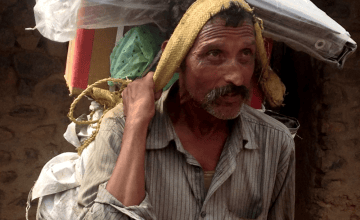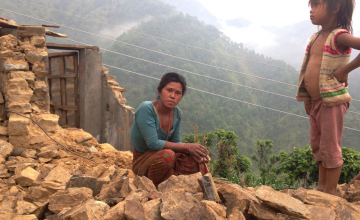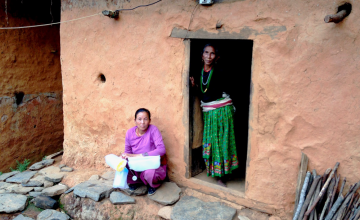
Read our 2023 annual report

Knowledge Hub
Off the road: the challenges of distributing relief to rural Nepal

Wind down the B.P Koirala highway to Sindhuli Madi and you’ll find an energetic town that seems to have entirely escaped the destruction of Nepal’s recent earthquake.
The half-built frames of buildings and neatly-stacked piles of masonry that are visible are in fact a sign of progress – this town has been growing quickly outwards into its surrounding valley thanks to the increased connectivity and business that the new Japanese-built road link has brought.
It is from Sindhuli Madi that Concern Worldwide, in partnership with Nepal Water for Health (NEWAH), has based its relief distributions to the surrounding villages and districts over the past month. During a turbulent trip to one of these villages, Tamajor, it became apparent that Sindhuli Madi is very much an exception to the hazardous rule that defines the rest of the region.
Difficult terrain
We set out along a sleek extension of the B.P. Koirala road, following a fleet of tractors and trucks carrying enough tarpaulin sheets, ropes, jerry cans, jugs, soap and hygiene kits for 450 homes.
Before long, the tarmac turns to dirt and rock — an ad hoc passage carved into the side of the mountains. Bumps and trenches begin to rattle the undercarriage of the truck with greater frequency. The dirt and rock then turns to running water. Our driver, Praveen, periodically jumps out of the driver’s seat, wades into the water and rearranges rocks in the riverbed, constructing his own personal road. Eventually, he advises we get out and walk for a few minutes.
We climb back into truck, the driver’s arms sopping wet, and drive through fields of rice and millet. Barrat, a project manager at NEWAH, points out villages that we will be distributing relief to over the coming days: Amale, Bittizor, Ratnawati, telling us of the toll the earthquake has taken on each one. The further we travel, the more impassable the roads become as dirt turns to thick mud. Once, twice, three times we get out to push the truck around a bend.
Ahead of us, the road has slipped away down the mountainside underneath a tractor. It desperately tries to rev its way out of a trench, its front end bucking like a horse. Eventually, a team of army reserves arrive to rescue it: after lifting the vehicle out of its trench, we see what little of the road is left and cross it with frayed nerves.
Distributions
Six and a half hours after departing from Sindhuli Madhi we arrive to Tamajor, where distributions are in full flow. Families flock around the district’s school, a sturdy, modern building. Men and women are tying packages to their backs and heads in preparation for the walk home.
Dhan Bahadhur Bhaju has come alone to ferry the items back to his family. He tells us “I have six daughters, so the sanitary towels here will help.” He is happy to receive the tarpaulin sheets as protection against the rain – their house has been badly damaged and has left the family exposed to nature.

We climb up from the school to visit Kanchi Maya Wiava who is working with neighbours to clear the rubble from her home. Her husband has been working in Qatar for the past year and has been unable to return to help his wife and children move the rocks and broken wood from their land. Kanchi Maya explains: “we cannot harvest enough from our farm to feed the family,” meaning her husband’s income is vital to make up the shortfall. They are all living in a neighbour’s house at the moment. "We are planning to build the house again as quickly as possible, but there’s not enough manpower in our community to do it."
Sanitation

Meena Khatik’s home is mainly intact. While they feel secure living indoors, the family intend to use the tarpaulin to house their buffalo. Milk production has been positive for them, but the cost of trade is high due to the challenges of transport, with a return of around 25 rupees (22 cents) on the litre. For Meena, the most urgent need is replacing the latrine that collapsed during one of the aftershocks. Like many of the people of Tamajor who have engaged with NEWAH’s sanitation programmes, the family are hygiene-conscious and are keen to avoid contamination of their clean water supply.
In 1990, only 6% of Nepalis had access to a toilet – Sindhuli district was well on the way to its goal of universal access to toilets by 2017, though damage from the earthquake could be a serious setback. When we return from our visits to Tamajor’s homes to the school, Barrat shows us the clean water and drainage systems that have been installed, illustrating why sanitation work like this is so important:
Before, girls would stop coming to school after they had begun menstruating, because there were no facilities for them. Now, it’s actually preferable for them to stay in school, and we are seeing more and more girls graduating.
The rehabilitation of community latrines and water systems will be the next, essential phase in Concern’s relief effort across the region.
As dawn breaks the following morning, we set off back down the trail towards Sindhuli Madi to find yet more of the road has slipped away down the mountains. “Tamajor, Amale… these are the easy districts,” a NEWAH manager tells us. “At least, we can reach them within a day. Hariharpurgadhi, where we will go next; that will take four days and four nights.”
You can help
A huge amount of work needs to be done to rebuild and support the people of Nepal. Please donate today.


